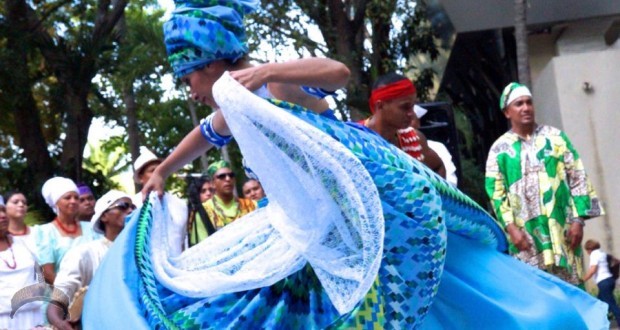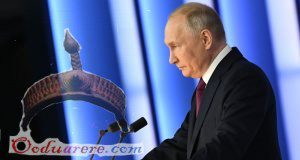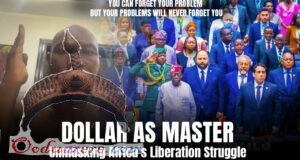Question: Why did you change yours around?
Fa’lokun: Because I was told to by the Orisa themselves. The Orisa were trying to tell me something. This was not an arbitrary decision. I am not trying to be politically correct. We have the political structure of Yoruba culture represented on a smaller scale in the extended family. Let’s take the issue of polygamy first. That’s always a hot issue. In Yoruba culture there is a very strict division of labor. We don’t have that in Western American culture. This means that we cannot use Yoruba culture as a literal model. What we can do is figure out the logic behind the Yoruba model and see if we can apply that logic to our circumstances. In Yorubaland it is absolutely taboo for women to farm and generally taboo for men to sell food at the market. The men plant the seeds and pull the weeds, the women process the harvest and sell the surplus.
The heart of this system is to insure that everyone is connected to a farm. If every extended family is associated with at least one farm, everybody gets to work and everybody gets to eat. One of the customs used to sustain this connection is polygamy. In Nigeria there are more women than men. Here in the west, polygamy seems to mean having as many women friends as you can as long as your wife doesn’t find out. In Yoruba culture there are primary relationships. What we might call love relationships. There are also arranged marriages that link single women to the system of farming. One of the tasks of Ifa is to make these arrangements and to do it in a way that is not abusive. The husband will only accept as many arranged marriages as he can support through farming. The balance of power in the arrangement is in the hands of the senior wife who is in charge of the distribution of resources within the extended family.
Not everyone is polygamous, because not everyone is able to accept this level of responsibility. In Nigeria the big spiritual crisis within the traditional communities is shifting the belief that every woman must have four children. This is a deeply held belief within the culture. I say that it is a crisis not because I am making some kind of judgment as an outsider, but because Yoruba women themselves are beginning to raise the question. The outdoor market places are beginning to have stalls that distribute birth control information. If you were to ask me what the solution is, I don’t have a clue. I am absolutely confident that they will solve the problem without my opinion.
The issue for us is the question of how do we establish functional families in Oakland now? The question I am asking is the question of whether or not there is anything in the Yoruba model of the functional family that can be used as a source of inspiration for creating healthy families in this culture? What are the checks and balances we need to establish in order to maintain a balance of power and purpose within the community? Go back to Malidoma Some’s definition of community. He defines community as three or more people who get together for a purpose. In Ifa, communities get together for the purpose of supporting and sustaining spiritual growth. We have an eternal structure that has existed for hundreds of thousands of years that we call family.
This structure has remained intact for countless generations while we watch new faces fill the position of grandmother and grandfather. The roles of grandmother and grandfather carry both respect and responsibility. Both respect and responsibility are seriously lacking in most Western families. The good people of Ode Remo would never do anything to disrespect grandmother and grandfather. It is unthinkable. The reason that this respect exists is because grandmother and grandfather serve a function that is recognized as having value.
This leads to the question, “What is the value of grandparents, what is their function? Their function is to guide the younger generations through the rites of passage that occur during different age periods in the growth cycle of all humans who live on earth. Grandmother and Grandfather know how to do this because they were trained by their grandmothers and grandfathers. This training is called initiation into the mysteries of Orisa.
The function of the extended family in Ifa is to provide a nurturing environment for procreation and to guide the individual members of the family through the natural cycle of growth and maturity. These cycles revolve around certain key milestones in human life. The first is birth, the next one is puberty, the next one is forming a lasting relationship, the next one is becoming an elder and the last one is becoming an ancestor. The entire family receives training on now to function during each of these stages of life and this information is passed on from generation to generation in the form of proverbs, folklore, sacred history, sacred drama, personal and communal ritual. We either pass through these stages arbitrarily with little or no training, as occurs in this country, or it happens efficiently with support.
The methodology for making these transitions occur efficiently and with support is called ritual and initiation. This ties it back to our original definition of Gelefun, sitting on the earth bringing white. The term white refers to mystic vision. The purpose of all rites of passage and all initiations is to center consciousness in a place where you feel good about yourself. When you are able to feel good about yourself, you are able to look beyond yourself to the source of consciousness and the source of consciousness is in light itself. When you feel good about yourself, you know that you are a good and blessed person, you feel connected with everything in the universe and that is called a mystical experience. Being guided towards mystical experience is the point of initiation and rites of passage.
So where do we get our understanding of mystical experience? Mystical experience is a feminine phenomenon. Mystical experience comes through placing all the elements of consciousness into perfect alignment. This is always symbolized as moving through the veil of the Goddess. In nature there are two common events that cause mystic vision without the help of human ritual intervention. These experiences are giving birth and orgasm. These two events are the paradigm for all rites of passage and initiation. By orgasm I do not mean ejaculation, I mean lights change color, knock your socks off, lose consciousness bliss orgasm. This is way beyond g-spot. In my opinion, Ifa initiation is man’s attempt to recreate the birthing experience. Many people do not agree with me on this point, but there is no doubt about it in my mind.
 Ọmọ Oòduà Naija Gist | News From Nigeria | Entertainment gist Nigeria|Networking|News.. Visit for Nigeria breaking news , Nigerian Movies , Naija music , Jobs In Nigeria , Naija News , Nollywood, Gist and more
Ọmọ Oòduà Naija Gist | News From Nigeria | Entertainment gist Nigeria|Networking|News.. Visit for Nigeria breaking news , Nigerian Movies , Naija music , Jobs In Nigeria , Naija News , Nollywood, Gist and more









